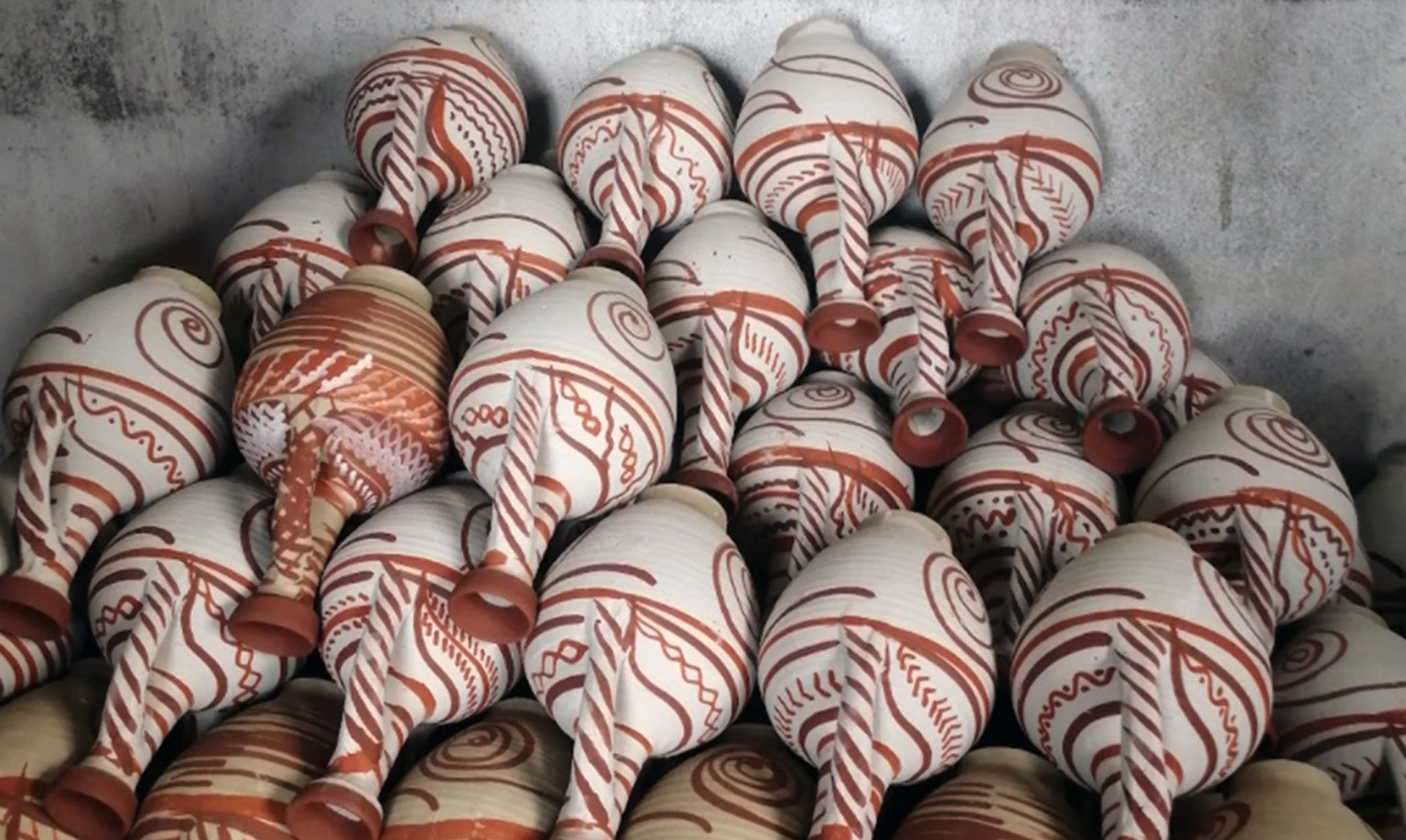Last December, Michel Tohme cut a defiantly cheerful figure at his humble Beirut showroom for handmade wooden tawleh (backgammon) boards. As his homeland lurched from crisis to crisis — economic collapse, political dysfunction and last year’s notorious Beirut port explosion — his long, proud career had reached the brink of destruction.
“I rely on tourists and foreigners to buy my boards,” Tohme confided. “Otherwise, I am out of business.”
Nine months on, Tohme’s worst fears have been realized. Recently, the 74-year-old artisan shuttered his showroom and joined his daughter in France for months. In his heyday, the master craftsman counted Saudi royals and Lebanese politicians among his clients. Now, Tohme’s workshop has lain dormant for two years, stripping away both his livelihood and his raison d’être.
In a September interview from France, Tohme explained: “This craft is in my blood — I don’t know how to work in anything else.”
Traditional handicrafts have thrived across Lebanon since time immemorial. Nobody knows when Phoenicians began making blown-glass vases around Saida and Tyre. For centuries, master weavers have tended their looms in Baalbek; woodworkers have fashioned intricate tawleh boards in Beirut and Tripoli; and cutlery-makers have whittled ornate camel-bone handles in Jezzine.
These trades have become synonymous with communities — in some cases, literally. The name Rachaya al-Foukhar, a village renowned for pottery since medieval times, means “The Rachaya of Pottery.”
In recent years, however, traditional handicrafts have struggled to evolve. Many younger Lebanese shoppers purchase mass-produced, cheaper substitutes for products that their ancestors once bought from local artisans. Some craftspeople have adapted, modernizing product designs and targeting lucrative foreign markets. Other artisans, especially older generations, have stuck rigidly to traditional production and marketing models.
Alarmingly, these shrinking markets are driving away the next generation of master craftspeople. A 2020 mapping study found that 62% of the sector’s labor force is aged 50 and above. A mere 5% of the businesses studied had been established in the past five to 10 years. Faced with bleak financial prospects, many youths choose new careers instead of inheriting the local trade.
Lebanon’s crushing economic recession could scarcely have arrived at a worse time. With businesses already crumbling, local artisans face fresh challenges. Nationwide electricity shortages force factories to operate at much-reduced hours, if at all. The devaluation of the Lebanese pound has made imported raw materials prohibitively expensive, and most Lebanese can barely afford essentials like bread, let alone handicrafts.
Yet if these diverse crafts eventually disappear, an entire people may come to mourn their passing. Even younger Lebanese have fond childhood memories associated with everyday traditional products, be they scattered around homes or on sale at bustling local markets. The extinction of these once-ubiquitous handicrafts risks shattering vital parts of a nation’s cultural identity — especially if centuries of know-how are lost forever.
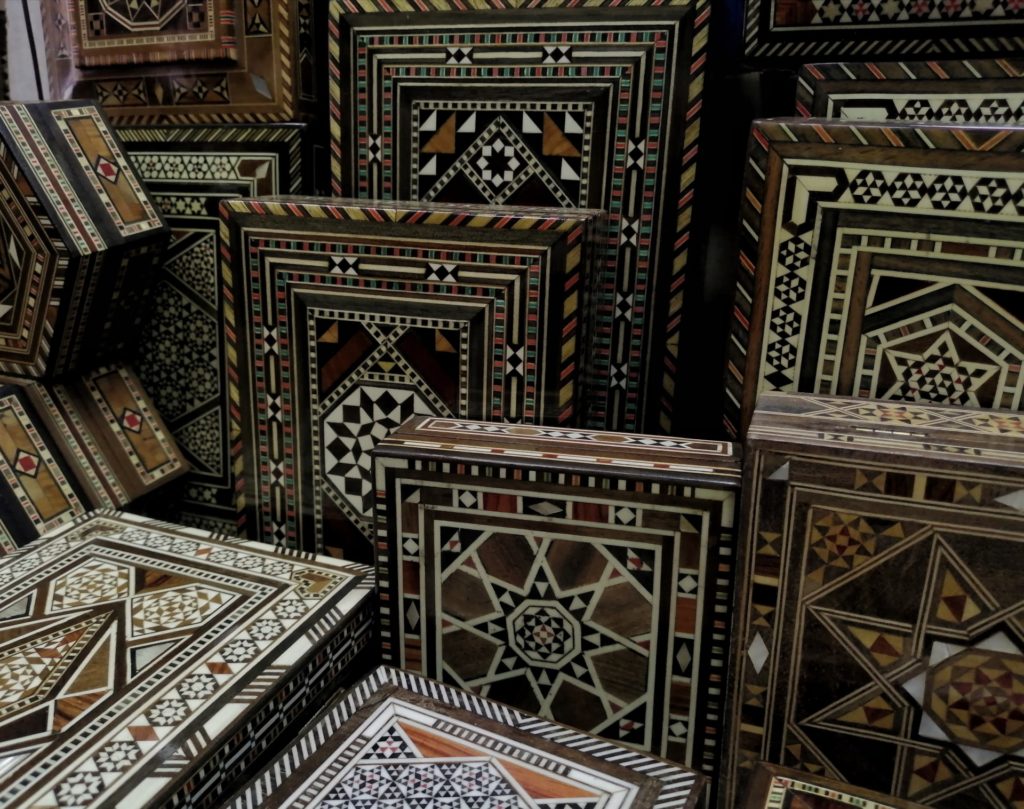
Not all Lebanese handicrafts manufacturers are facing a crisis of confidence. At his factory in the central Beirut suburb of Jisr al-Wate, Elie Tohme (the son of Michel’s cousin) offered a brash self-assessment as the proprietor of Joseph Tohme & Sons, a tawleh board company.
“I am the most famous producer of handicrafts and tawleh boards in the world,” Elie declared, leaning back nonchalantly in his office chair. “And the best is yet to come — I haven’t even started yet.”
To Elie’s right, a monitor displayed eight security camera feeds from his factory — a hive of activity, even on a late Thursday evening. Also on the desk was a plaque offering “a token of appreciation and respect” from the Lebanese Backgammon Association — of which Joseph Tohme & Sons is the official sponsor.
Tawleh occupies a special place in Lebanese culture. While the ancient game may have originated in Mesopotamia, countless generations of Lebanese have grown up to the sound of dice being thrown on wooden tawleh boards. Every weekend, family and friends scheme against each other in pursuit of victory. Winners claim the cherished title of malik al-tawleh (the backgammon king), while losers are dispatched to buy ice cream or perform some other ignominious task.
Even more than most, Elie was born into a world of tawleh. His father, Joseph, built handcrafted tawleh boards according to his own father’s traditional methods. When Joseph passed away in 2017, Elie abandoned his DJing career and took over Joseph Tohme & Sons.
Once in control, Elie claims that he promptly sold his car to buy a laser machine, a controversial tool in the eyes of woodworking purists. “My problem with classical tawleh boards is that they are restricted to straight geometrical angles,” he said.
Elie’s laser technology has one main function: imbuing tawleh boards with images of celebrities’ faces. “I believe there is a connection between tawleh originally being a game of kings and now, with celebrities,” he offered.
After completing each project, Elie tracks down the relevant celebrity — be they Ronaldinho, Emmanuel Macron, or Queen Silvia of Sweden — and gives them a personalized board. Finally, the trusty Joseph Tohme & Sons marketing team broadcasts the presentation to the company’s more than 27,000 Instagram followers.
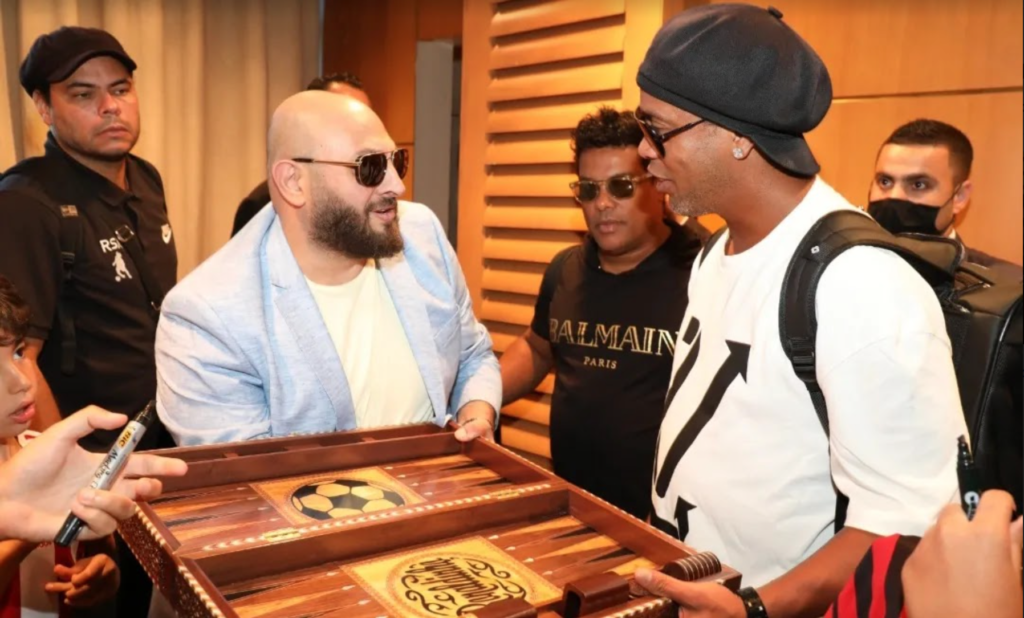
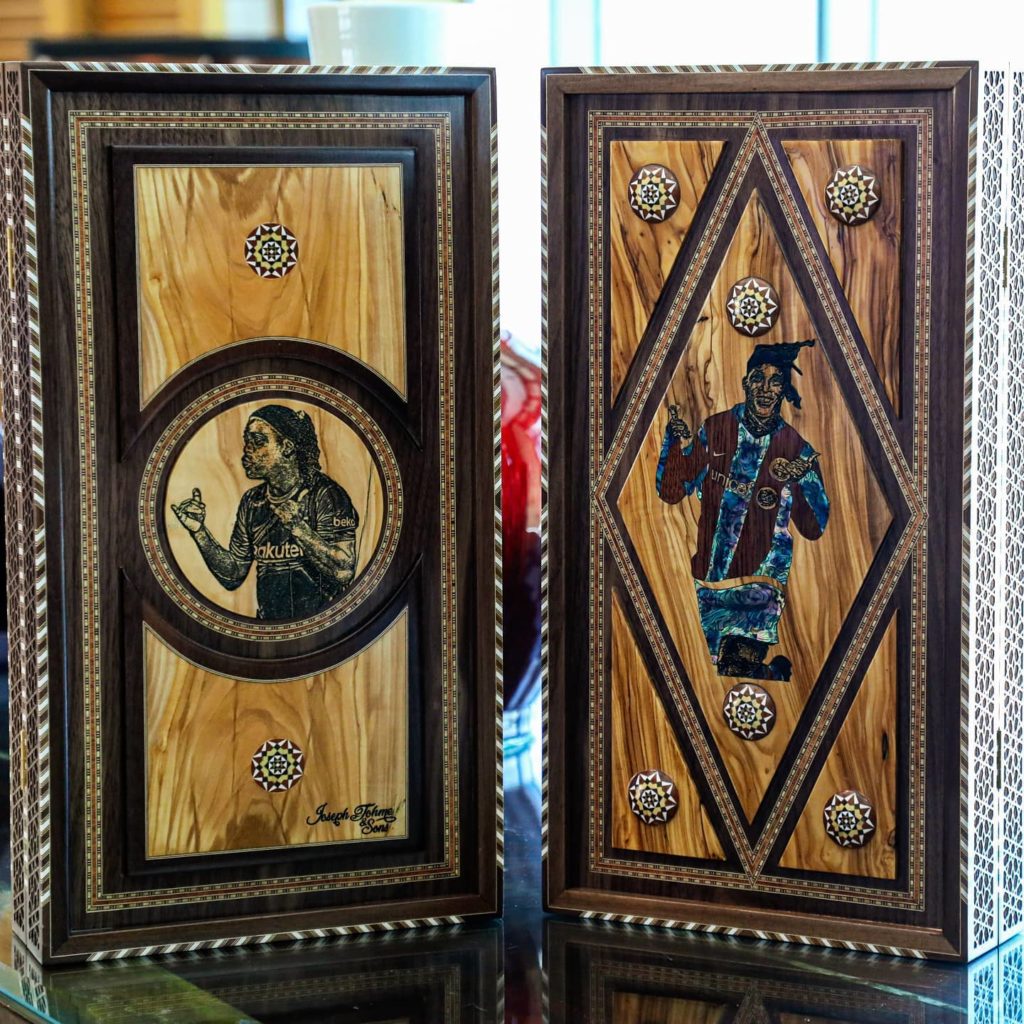
Celebrity photo-ops represent some of Elie’s less outlandish publicity stunts. His social media followers can watch Elie drifting in a Joseph Tohme & Sons-branded car or dancing in a crowd improbably jubilant about tawleh boards. He is also attempting to enter the Guinness Book of World Records — for building the world’s largest tawleh board, naturally.
Repeatedly, Elie declared himself untroubled by Lebanon’s economic crisis. Within four years, he claims that the company is producing five times more tawleh boards than his father did, despite tripling prices.
To survive, Elie places enormous faith in his willingness to break artistic conventions — from Lebanon and beyond. “For artists like da Vinci, after 300 years, the colors fade away,” he enthused. “The colors never change on my boards. … They will last for 1,000 years — or more!”
Far from Elie’s factory in central Beirut, Wassim Khalil brings his own panache to the ancient Lebanese craft of pottery in remote southeastern Lebanon. Cigar in hand, Khalil dodged unruly chickens while moving between houses in Rachaya al-Foukhar, where locals have turned the area’s rich clay into pottery for centuries.
As a child, Khalil learned the art of pottery from his father, a prominent maalim (master craftsman) in the village’s once-vibrant pottery scene. “My brothers and I all trained to become potters — but I was the only one who made it onto ‘the wheel,’ ” said Khalil, in a testament to the longevity of sibling rivalries.
Rachaya al-Foukhar’s potters take immense pride in their special Richaniyya (“Rachayan”) technique. Over several days, artisans mold the village’s signature water pitchers from the bottom up, a process that takes longer than other pottery methods.
According to Khalil, he had reached the status of pottery maalim before the Lebanese Civil War broke out. Rachaya al-Foukhar, nestled on a hill around 6 kilometers (4 miles) from the Israeli border, inevitably found itself mired in the conflict. Khalil himself spent three years in prison before immigrating to the United Kingdom when the war ended.
While living in London, Khalil worked as a contractor and dabbled in pottery during his spare time. Yet the British capital proved too hectic a backdrop for Khalil’s passion. “You need a clear head to work in pottery, and I could not get that in London,” he recalled.
Eventually, Khalil yielded to his vocation’s call. In 2009, he abandoned his life in London and resumed his place on “the wheel,” back in Rachaya al-Foukhar.
Aside from his return, Khalil’s journey mirrors the wider fate of pottery in Rachaya al-Foukhar. Before the war, as many as 80 potters were active in the village. That number has since shrunk to just five artisans, all aged 50 and above. The war drove many young locals to move elsewhere, and today’s youth see no future in the industry.
“We are the last generation that will continue this craft,” Khalil predicted.
Indeed, powerful market forces have militated against Rachaya al-Foukhar’s pottery industry. Where previous generations viewed clay products as essential household items, modern consumers usually prefer glass or plastic alternatives. Local potters have also struggled to reach more lucrative markets — both in Lebanon and abroad — with effective marketing strategies.
The economic crisis has now imposed more gloom on the industry’s outlook. Most of the potters cannot access enough electricity to run their communal ovens, for several days, at the very high temperatures required. Ironically, power outages have not impacted Adib al-Gharib — the village’s oldest potter and undisputed head maalim — because he has always insisted on using an old-fashioned, wood-fired oven.
The remaining potters continue working out of passion, but hundreds of unsold pieces lie wrapped in cobwebs for now. Khalil fears that Rachaya al-Foukhar will never look the same if the pottery industry finally collapses. “For a start, we would need to change the village’s name,” he noted grimly, forcing a slight chuckle.
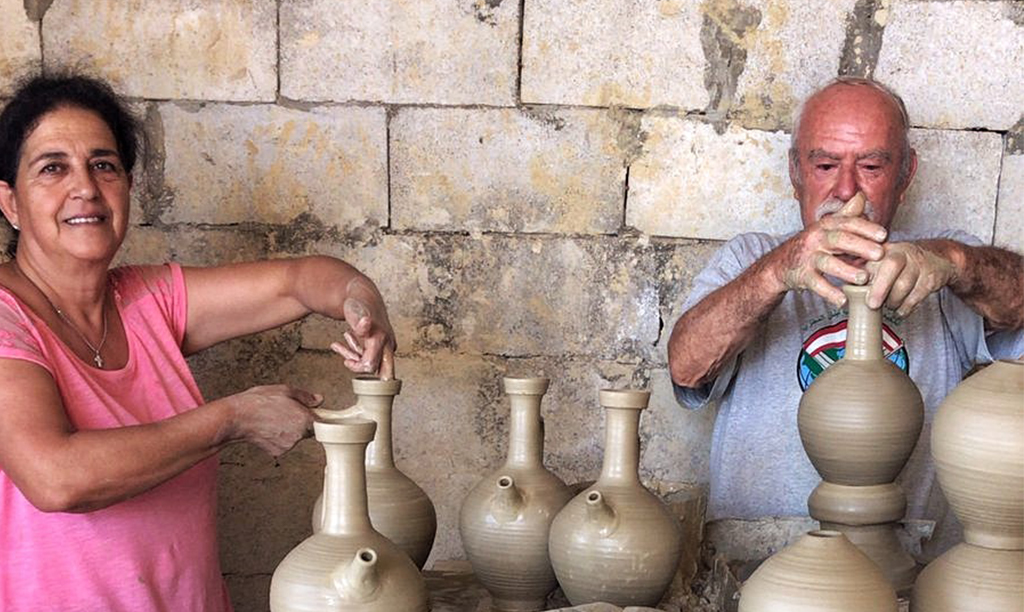
The current plight of Michel Tohme belies a grand tradition worthy of Rachaya al-Foukhar’s pottery masters.
Long before his crisis-induced closure, Michel ran one of Lebanon’s most successful companies for handcrafted tawleh boards. From the age of 10, Michel’s father inducted him into the secrets of constructing boards — lore passed down from their ancestors. In 1973, Michel inherited his family’s factory and has run the business until today.
Michel’s production process proudly does not cut any (non-wooden) corners. For each board, Michel painstakingly carves and assembles up to 200 pieces by hand, with not a laser machine in sight. His signature flourish lies in each board’s floral designs, which cannot be found elsewhere.
“If you see a tawleh board in the market, you know it is my father’s because of … the flowers,” said July, Michel’s daughter. “His fingerprint is on the board.”
From the 1980s until the early 2000s, Michel’s woodwork achieved fame and recognition. King Fahd of Saudi Arabia secured one of Michel’s tawleh boards, while Lebanon’s Presidential Palace commissioned an ornate set of handmade wooden chairs.
The business slid into a steady decline from the mid-2000s, when cheaper handmade tawleh boards started flooding into the Lebanese market from Syria. This development made local customers less inclined to buy Michel’s pricier offerings. In 2010, Michel’s son quit the family business — Michel has struggled to replace him ever since.
As things stand, it is hard to see how Michel’s business can emerge from Lebanon’s economic crisis. Production has effectively stopped in the past two years, owing to plummeting market demand and unaffordable overheads for raw materials and electricity. Recently, Michel has not even been able to fill his gas tank and visit his factory in Mkalles, just outside Beirut.
July fears that her father has become an unwitting victim of his own exacting standards of artisanship. “If I tried to launch a website to sell his products in Europe, it would be more expensive than the market rate,” she said. “Nobody will buy them, unless that person knows the preciousness of his work and his craft.”
Michel has sacrificed everything for his passion — including his health. He currently battles chronic eyesight problems, stemming from decades of squinting at his tawleh boards, which also contributed to his mutilated fingers.
Yet retirement does not beckon for Michel — if he can avoid it.
According to July, “If my father had gas to drive to his factory and there was electricity, he would just endlessly sit there and work for the love of it.”
Additional reporting by George Assarian.




